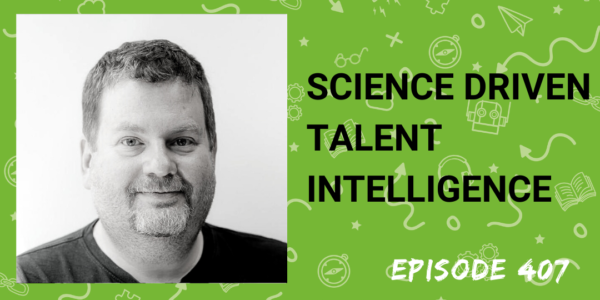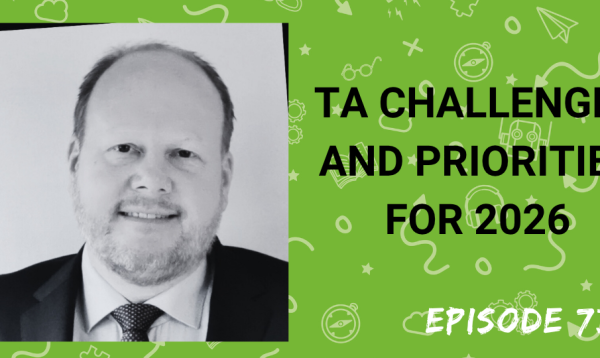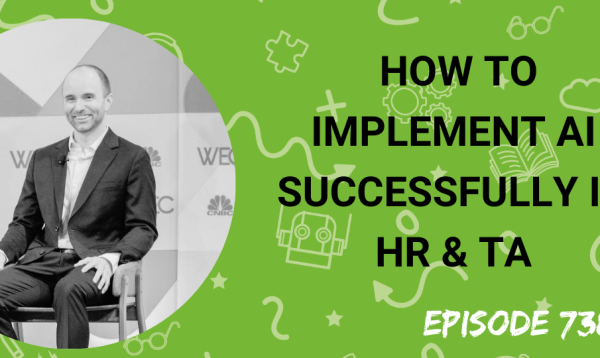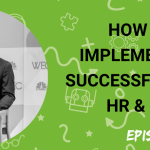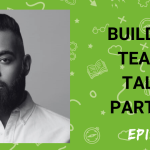Talent intelligence is something that has gathered significant momentum in the last three years, and data-driven decision making is a crucial part of every sophisticated talent acquisition function. But are we asking enough questions about the sources of the data that is used and truly understanding the risk of bias?
My guest this week is Markellos Diorinos, CEO at Bryq. Markellos is passionate about using objective science and unbiased data to inform hiring and internal mobility.
In the interview, we discuss:
• Data supported decision making.
• Challenging recruiting norms
• The importance of human decision making
• Biased data and reliable data
• Understanding culture in an objective scientific way
• Translating a cultural framework into specific behaviours
• The role of technology
• What does the future look like?
Listen to this podcast in Apple Podcasts.
Interview transcription:
Bryq (0s):
Support for this podcast is provided by Bryq. Bryq provides you with talent intelligence that works, eliminating biases, time constraints, and inefficient decisions in a world that’s increasingly rejecting subjectivity. Bryq’s end-to-end AI-driven talent intelligence empowers you to make data-driven decisions across the employee life cycle; from hiring, development, and mobility, to performance optimization and culture. Bryq’s science-backed approach is the only solution to inform every talent milestone by combining your data with their validated psychometrics.
Bryq (42s):
Visit bryq.com, which is spelled B R Y Q to book a demo with the talent intelligence team and realize the full potential of your business.
Matt Alder (1m 11s):
Hi there. This is Matt Alder. Welcome to episode 407 of The Recruiting Future Podcast. Talent intelligence is something that has gathered significant momentum in the last three years. And data-driven decision-making is a crucial part of every sophisticated talent acquisition function. But are we asking enough questions about the sources of the data that is used and do we truly understand the risk of bias? My guest this week is Markellos Diorinos, CEO at Bryq. Markellos is passionate about using subjective science and unbiased data to inform hiring and internal mobility.
Matt Alder (1m 54s):
Hi, Markellos, and welcome to the podcast.
Markellos Diorinos (1m 58s):
Thank you for having me, Matt. It’s a pleasure to be here.
Matt Alder (2m 0s):
An absolute pleasure to have you on the show. Please, could you introduce yourself and tell us what you do?
Markellos Diorinos (2m 6s):
I’ll be very happy to do that. I’m Markellos Diorinos. I’m the CEO of Bryq. And Bryq is a talent intelligence platform. What we’re aiming to do with Bryq is help companies make better HR decisions through the use of objective data. And when we say HR decisions, this is definitely hiring, but not only that, it also includes the way that we look at talent, how we promote it, how we grow talent, how we retain talent. Essentially, we want to be a platform that deals with talent from cradle to grave, or I guess a better part of saying it is it’s going to be from hiring to retiring. It doesn’t have to be from cradle to grave, and that’s what we do.
Markellos Diorinos (2m 50s):
How can we enable all these HR practitioners, who are faced with the impossible task of making all these decisions, to do a better job and have better data-supported decision making.
Matt Alder (3m 1s):
Now with the events of the last few years, I can’t think of a time where talent acquisition was more under the microscope, was being disrupted in a greater way, and also was tough of a company. So it’s a really interesting time in the industry at the moment. And I suppose it’s a time where we’re seeing lots of the recruiting norms that we’ve lived with for years and years and years, being challenged, like never before. What are some of the things that you’re seeing at the moment in the market? You know, what’s being challenged? What are the recruiting norms that we should be aware of and be doing differently?
Markellos Diorinos (3m 41s):
That’s a great question, Matt. Here’s what we think has happened. The two last years have been unprecedented in so many ways. Unfortunately, most of them, are not good, but be that as it may, what we’ve seen is HR really rising to the challenge. And they’re literally the unsung heroes who kept society working. They’re the ones who kept businesses running and, you know, people going to work or working remotely or adapting to all these extreme circumstances. And this gave them an ability that it actually laid bare the fact that the emperor had no clothes. So a lot of the shortcomings of the current processes became now suddenly apparent.
Markellos Diorinos (4m 24s):
And that was a wake-up moment for a lot of people. And this was not just the realization that, oh, you know, our process needs improvement, but then we see the fallout from that. We see now the wave of the great resignation, which is what people realize that they’ve been trapped to a career for decisions they probably made 25 years ago, when they took the first job out of college, right. And that put them on a career path. And they had a very hard time escaping from that. Or people who never got the chance because of a number of reasons. So people are looking at recruiting norms and guess what? Most of the recruiting that we do is based on what we call skills and experience, which is weird if you think about it, that we have a whole body of science, all of the industrial-organizational psychology that actually talks about that and says, look, here are the predictors of future job performance.
Markellos Diorinos (5m 20s):
Here are the things that are going to help you find better employees or match people to the right position for them. And you know what? Job experience and skills, actually rank dead last in that taxonomy. Their correlation with how successful someone’s going to be is very low. It’s .13. It’s very close to zero. And this is where we need to start thinking if that doesn’t work, what will? And again, we don’t have to innovate. We don’t have to invent things. We just have to go and see what IO psychology tells us. And it’s going to tell us, look using a combination of skills, basic skills, cognitive skills, not the fact that I know how to code Java, but the fact that I can deal with numbers or that they can solve problems.
Markellos Diorinos (6m 8s):
And personality telling me what I actually enjoy doing, this is what’s going to help us predict job performance the best. And I always emphasize the best, because it has a super high correlation. It’s almost 0.71, but it’s not perfect. We should not replace human decision-making with the machine, pressing a button and, you know, out comes your future job career. No, it’s a combination of what you can excel at and what you want to do.
Matt Alder (6m 37s):
Just going back to what you said right at the beginning about talent intelligence. And talent intelligence is a phrase that’s being used more and more often, and I’m not sure sometimes people really kind of fully appreciate what it means or what it can mean. So talk us through your definition of talent intelligence. And also your view on the data that employers are sort of currently using to feed into that intelligence.
Markellos Diorinos (7m 7s):
I’ll be happy to. When we talk about talent intelligence for us, it’s about how do we take this mountain of data and not drown people under that? You have to be able to see the forest for the tree and vice versa. And what’s important here is how do we find which data pieces are relevant? Because I can have tons of data. There are people out there looking at billions of data points and they’re saying, oh, we’re the best solution because we have this many billions of data points. Are they relevant? Are they actually a great predictor of what you’re looking for? Talent intelligence is all about that. How can I find data? How can I relate them to my goal at hand?
Markellos Diorinos (7m 50s):
How can I empower my HR practitioners to make better calls? How can they make better decisions without having to do extra work? And, you know, by the way, whenever we try to put some automation and process, a bit of efficiency comes in the way, which is, can I be better? Can I be faster? Can I handle more people? Can I look at more people so that I find the right talent from within, you know, from a thousand candidates instead of only considering 10 or 20? So this is what talent intelligence really is. And that takes me back to my first point once we realized that. And by the way, we talked about this and think about the applications of talent intelligence is about how do I find the right talent from a thousand people to hire, or from 10 people and understand which one’s more successful, but also how do I look at my internal talent and figure out what their career path is?
Markellos Diorinos (8m 40s):
How do I look at people who are working, not functionally equivalent teams, but with different characteristics, and then make sure that each person is assigned to the proper team. And this is the kind of work we do with our customers, right? We have a customer who is a call center, who said, look, 5,000 agents, they are not happy. And they have very high attrition rates. Help me optimize that. Help me understand who matches which team and how I can bring them together so that I can optimize both their performance while reducing the churn.
Matt Alder (9m 14s):
I think what’s really interesting is with all the talk of talent intelligence and the enthusiastic nature that people have looked at data in the last few years, and really, you know, seeing how much value it can bring to the process, you know, in the ways that you’ve just outlined and lots of other ways, but we haven’t really thought critically about the data that’s being used. And do you think that there is bias in the data that employers are using? And if so, how do we sort of achieve talent intelligence based on objective data?
Matt Alder (9m 56s):
And what would the data sources be that employers should be looking at?
Markellos Diorinos (10m 2s):
That’s a very valid point. And, you know, whenever you start applying automation or AI, for that matter, on any given data set, this assumes that you have a functioning process. The process is functioning well, and I’m going to automate it, or I’m going to use AI to enhance it and make it better, faster, stronger, whatever. But what we came to realize, especially for the past couple of years, is that our current hiring paradigm is broken. We have a lot of bias. We’re not giving people equal chances. We’re selecting people for all the wrong criteria. And I was reading an article today talking about hiring developers. And they were saying that you know, one of the common criteria is that A – people have a degree, which is helpful, but not necessarily a requirement.
Markellos Diorinos (10m 47s):
Or sometimes that even that degree comes up from very specific schools. We’re looking for skills and keywords, and we’re throwing away candidates because they don’t have keywords X or Y. This is all very short-sighted. And if we look at the body of data that we have, this is the result of short-sightedness. If I look at my developers, for example, I’m definitely going to find a slant there towards male people, most probably. Because we’ve traditionally been taking developers as male, something that has no basis whatsoever. And once you realize that, then you’ll realize that by taking all this data and analyzing them, and then coding them into AI’s or process or whatever, what you’re doing is that you’re codifying all these mistakes that we’ve been doing.
Markellos Diorinos (11m 35s):
You’re codifying the bias over the past years. And you’re saying now let’s make sure that we keep repeating exactly the same mistakes. And I’m sure that no practitioner is wanting to do that, right? Everybody’s looking for a way to do better, to improve the process, and not just repeat the mistakes of the past faster. Once you realize that, then the question is, okay. So if none of this works, what does work? And this is where we go back to what I’ve been saying earlier. We need to look at what is a predictor of performance? What is it that makes people tick? Is it going to be, you know, their cognitive skills? Is it going to be their personality match?
Markellos Diorinos (12m 15s):
Is it going to be the fact that they’re a good cultural match for the company? Because you know, we always take the, will you understand that a developer who’s great for Microsoft is not necessarily a developer who’s also going to be great for Bryq. Even though from a skill-space, these people might be exactly the same. They know the same things. They have the same training and so on, but they all seek very different cultures. So once you understand these things, you say, okay, now I need to shift my criteria. I need to do away with all these things, which by the way, are biased and they’re biased towards genders, minorities, and so on and so forth. And let’s start by getting some real data from people themselves.
Markellos Diorinos (12m 57s):
Let’s give them an experience that’s great, where they share with us what it is that they can do and what is it that they want to do. So we run a really fast assessment that takes about 20 minutes for most roles, whether you’re hiring for a product manager, data scientist, a developer, or a call center agent. And they go through that. And we actually have data that we can rely on because we gathered them from the source. They don’t come from here, say they don’t come from LinkedIn. They cannot be embellished. They cannot be inaccurate. They cannot be customized to fit our very specific requirements. And once you have that clean database, then you go and say, okay, now I understand who this person is.
Markellos Diorinos (13m 40s):
Let me figure out what it is that I’m looking for to match them to the specific requirement. And here’s where we made the huge leap. Because typically whenever you go and you are looking to what does my next data scientist, or what does my next marketeer look like? If you take a box that says here’s a market here and here are the 10 things that make a successful marketeer. And what our customers have been saying from day one is that my market here is not like that. I have very specific requirements or I have two positions for marketing coordinators. They’re different. They don’t fall into the same box. So the ability to go and customize the role profile, the ideal candidate profile, if you like, on the very specific requirements, of which, the job description has been key and very important to the success of customers.
Markellos Diorinos (14m 35s):
So what we’ve been doing is that we’re looking at not giving you a box that says, you know, the market coordinator, but we’re giving you an AI, that’s looking at IO again and saying, Hey, what is requested from this marketing coordinator? They need to talk with customers. They need to do project management. They need to do budget management. They need to be great with analytics, or they need to be very innovative. They need to be great at copywriting. What do you prioritize in your very specific job description to build the profile of who you’re looking for? Will it stop thinking of talent as very discrete boxes? And we need to think of people who sit next to each other with maybe the same role who have very different skill sets, who have very different personalities, who are being successful in different ways.
Markellos Diorinos (15m 25s):
And this is what ultimately makes great teams, right? It’s not about having a cookie-cutter approach, where everybody looks exactly the same, but it’s about tailoring each role, tailoring the individual requirements, and making sure that we’re always finding what we need for the specific purpose. These are the things that make a difference in looking for talent, where you’re now starting to say, I’m not looking for the cookie-cutter approach of a successful X or Y, I’m looking for people who have what it takes to become great in this role.
Matt Alder (15m 56s):
Just to drill down on what you were saying about the culture there. Culture sort of comes up time and time again. People talk about culture, culture fit, all these kinds of things. It always tends to come up in a very subjective way in terms of someone’s view of the culture. And that can be dangerous in terms of unconscious bias or also conscious bias in terms of making judgments about whether people will fit in within an organization or not. How do you think, or how could that be made more scientific from a data perspective, rather than being potentially a very dangerous, subjective judgment?
Markellos Diorinos (16m 42s):
That’s such a great subject. And it’s really interesting that you have a world-like culture, that ends up having so many meanings. So when people talk about culture, most of the time they’re thinking about engagement surveys. And what engagement surveys tell us is how people feel about specific issues within the company, which by the way, are very useful. And we shouldn’t do away with them, but they’re giving us an aggregate view. And it’s always, after the fact, I cannot run an engagement survey with someone when they’re about to join the company. Or a lot of times when we go into hiring, people are going to be thinking about organizational culture. And those tend to be rigid frameworks, that address very specific issues like no hierarchy, or how we deal with work and so on so forth, but they still fail to capture the essence of what the company is.
Markellos Diorinos (17m 35s):
When you go and you visit websites, you’ll see time and time again, that companies are not going to talk about organizational culture. They’re going to talk about the culture in terms like, oh, we believe in integrity or we believe in innovation. We are data-driven. We have a bias for action. All those things that actually relate to the behaviors that they expect people to have. They’re saying, here are the things that we’d like our people to do. And if you think about every behavior on a spectrum, on a continuum, this is where we’d like our people to lean. And thinking about culture, it’s really hard until you start saying, can I actually measure it? And the engagement survey is not going to help you with hiring.
Markellos Diorinos (18m 17s):
It’s even not going to help you with understanding the culture of a large organization, because it’s not going to tell you where the problem is. So yes, the company is not doing great with integrity, but why is that? Is it because of people? Is it because of managers? Is it because of management? What is the root cause? And here’s where we take a very different approach, where we’re taking the cultural framework of the customers. Those exact things that we’ve described, like integrity, take that for example, and saying, okay, integrity; what does this translate to in terms of behaviors? Integrity means that people who are acting with integrity are probably really conscious, right?
Markellos Diorinos (19m 2s):
They’re going to obey rules and they’re going to be forthright. They’re going to be expressing their opinions regardless of what. And they’re going to be thinking, analyzing, and evaluating items. And most probably they’re going to be more objective than most; meaning that integrity requires you to work based on data, not based on your sentiment. So once you realize that you’re saying, okay, so there’s actually a recipe for what integrity looks like in terms of your personality. And if I can measure that, then a whole host of opportunities opens up because now I can measure the cultural match for each individual and I can start hiring for culture add instead of culture fit.
Markellos Diorinos (19m 45s):
And I always make this distinction here, because this is not the clone wars, right? So you don’t want to create an army of clones that all think alike and follow the same cookie-cutter approach. This never leads to success. You’re going to lose the diversity of thought. So what you want to do instead is look at the culture of its team and say, here’s my team. Here are my five cultural pillars. Where does my team suffer? Is my team suffering on integrity? Then the next hire I’m going to bring into the team better, have higher integrity because this is going to help the whole team thrive within the concept of the organization. And this is actually the secret to starting designing teams that in aggregate are more than the sum of their parts.
Markellos Diorinos (20m 29s):
You’ve seen this again and again, and it’s very hard to pronounce it. When you say all these people compliment each other so well, you know where one stops the next one starts. You can actually now start thinking about designing that.
Matt Alder (20m 41s):
You mentioned this earlier, but again, I just want you to expand on it a little bit. And that’s the role of technology in all of this, you know. You mentioned that technology is not foolproof and that humans still play a big part in it. What’s your sort of view on that technology recruiter relationship and you know, what should we expect from technology?
Markellos Diorinos (21m 7s):
This is a very interesting topic because, why now? This is a question that we get a lot of times from customers. Why is it now a great time? Why didn’t you have the solution five years ago or 10 years ago? And the answer is that we are at a pivotal point in history, where we have enough advancements in different areas that it now starts making sense. The things that we’re doing today, we couldn’t do five years ago. I couldn’t even think about 10 years ago. And that goes anywhere from the customer experience, from the candidate experience to the fact that we now have the ability to crunch data on mass and do this in a reasonably priced manner.
Markellos Diorinos (21m 47s):
The great solutions do what has been done for the past 50 years, and they’re looking at that and they’re saying, okay, let me not take that. Take things that are proven and make sure that I make them easy to use. I make them economically viable. I give you solutions that are applicable for your business without needing an army of [inaudible] psychologists in-house that are going to help you interpret every single data point. And this is what solutions like Bryq represent. The challenge for recruiters is that, and HR practitioners in general, it’s hard to understand what solution is which. And there is a number of solutions that are taking, you know, invalid data points or things that look good.
Markellos Diorinos (22m 30s):
And they’re just perpetuating problems at [inaudible]. And we’re putting the onus on the recruiter to figure out which solution is which, which is really, really hard. And they don’t have the background on understanding all these different technologies and getting the deep dive. So it comes down to people like you to spread the word and say, look, here are solutions. You have to understand what’s behind them. You have to understand why they’re valid before you make a choice. So don’t just go for shiny objects that look good and promise a lot, try to understand why what you’re doing is valid. Try to look at the metrics of how this is going to impact your DENI, why this is going to bring you more diversity, why it’s going to be uncovering more talent.
Markellos Diorinos (23m 15s):
And look at all these proof points to make sure that what you’re looking for is a solution that actually helps, and is not just faster and shinier than what you had before. It’s not an easy task I tell you, and this is why I love being here. And I love talking about these items because how else are people going to know?
Matt Alder (23m 33s):
Well, exactly. It’s a very interesting time. It’s a very complex time. And as you say, it’s a very pivotal time in terms of the way forward. And that sort of brings me nicely onto my final question, which is about the future. I mean, what do you think the future is going to look like? How is talent acquisition going to change? And you know, what kind of data rigor are we going to be using in the future?
Markellos Diorinos (23m 58s):
Whenever they ask me about the future, I always liked to quote William Gibson. And my favorite quote of him is that I’m sure I’m paraphrasing, but it was something along the lines of that, “The future is here. It’s just not widely distributed yet.” What we’re talking about today is actually the future of work. It is the future of talent acquisition. When we stop looking at biased individuals, we stop, sorry, biased indicators, we stop trying to make good decisions based solely on the gut, which works sometimes, but definitely doesn’t work all the time. And we started thinking about what does science says, what are things that I can rely on?
Markellos Diorinos (24m 39s):
How can I make my process better? And at the end of the day, it’s never about how can I automate everything. Don’t try to do that. Removing the human element is as wrong as doing everything by humans. You have to find the balance where you say, here are systems that are giving me data, things like Bryq that are going to help me understand what’s happening. They’re going to help me find hidden talent. That is going to help me set aside my own biases and start looking at candidates, start looking at employers with a fresh eye. Start looking at aspects of individuals that I didn’t have access to before, because I cannot assess someone’s personality in five minutes.
Markellos Diorinos (25m 19s):
Neither can I assess their cognitive abilities in an interview. You know, it’s just doesn’t work. And we know this again and again, but once you realize that these tools can help you look beyond that, and they start giving you a solid basis, then as a recruiter, I have a whole host of opportunities ahead of me because I can now go and have top talent that I didn’t have access to before. Remote hiring has been a challenge for most people, because how can they find talent in say, I don’t know, east Asia, the Philippines, Vietnam, are there viable developers there that I could be using? How am I going to select them? How do I know that they’re going to work well with my existing teams?
Markellos Diorinos (26m 2s):
These are questions that seem insurmountable to recruiters today. But once they realize that the tools are out there and they can help them answer exactly these questions, they can widen their talent pool because now the world is the recruiter’s oyster. They can go and find the right person anywhere. They can do this in mass because the systems are going to support them to look extensively and individually at thousands of candidates. We opened a position at Bryq for hiring a content writer, a couple of months ago, and we received 2,300 applicants. If I were a recruiter, I’d be just trying to come up with criteria to throw away people, right, limited to a specific radius or a country or this or that.
Markellos Diorinos (26m 45s):
If I have job-related criteria, then I can have the top 10 out of 2,300 people and find the best talent out of a huge pool. And this is when you start adding significant value to the business. When you start doing these things and you start bringing the right people who are going to be a great fit for the company, and you do this regardless of anything else, regardless of race, regardless of location. So it’s starting to become a great environment where the recruiters stopped doing the groundwork, which was reading resumes and trying to define if that person would be a great fit or not. If that person would be a fit for the company culture, if they’d be a great match for the specific hiring manager and they can focus on what they’re great at.
Markellos Diorinos (27m 26s):
They can look at high promising individuals. They can talk to them. They can actually sell the company because, in a way, recruiters are just salespeople, right? They’re selling the vision. They’re selling the company. They’re selling what it is to candidates that can attract the talent. They can bring them in. They can lock them in. And they can also do this by having a reasonable assurance that they’re doing this for the right people. That they’re giving every candidate a fair chance to succeed because they’ve been selected on what matters. So I think it’s going to be a great new day for recruiters, where they’re going to be focusing more and more on the things that they like to do, or the things that they’re going to be great at, instead of trying to deal with thousands of resumes and applicants or making sure that they keep their excel’s updated and they track everything by hand.
Markellos Diorinos (28m 12s):
This no longer makes sense. This is not what they’re great at, but they’ve shown that they’re great at showing compassion and understanding people in making them successful. And this is what they need to keep doing.
Matt Alder (28m 24s):
Markellos, thank you very much for talking to me.
Markellos Diorinos (28m 28s):
It was a pleasure, Matt.
Matt Alder (28m 30s):
My thanks to Markellos. You can subscribe to this podcast in Apple podcasts on Spotify or via your podcasting app of choice. Please also follow the show on Instagram. You can find us by searching for Recruiting Future. You can search all the past episodes at recruitingfuture.com. On that site, you can also subscribe to the mailing list to get the inside track about everything that’s coming up on the show. Thanks very much for listening. I’ll be back next time and I hope you’ll join me.

